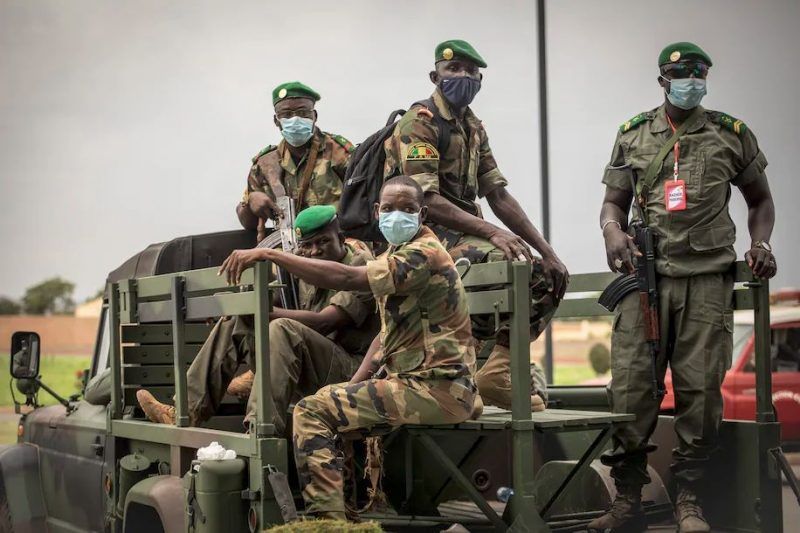
On Aug. 18, a group of military officers forced Mali’s president, Ibrahim Boubacar Keïta, to resign. Among other concerns, the officers expressed their dissatisfaction with the government’s handling of ethnic violence in the country.
While the coup officers and regional leaders discuss how Mali will return to civilian rule, our research suggests an unintended consequence of the coup: Will the U.N. peacekeeping operation in Mali, MINUSMA, be able to continue its efforts to prevent the country’s security situation from deteriorating further?
So what is the United Nations doing in Mali?
MINUSMA deployed to Mali in 2013 as part of an international effort to restore order to parts of the country ravaged by conflict. The mission’s main goals are to support a negotiated peace agreement signed in 2015 and protect civilians from violence by armed groups. The Malian government under Keïta was a critical partner for the United Nations in these stabilization efforts.
Unlike past peacekeeping operations in other settings, MINUSMA has become far more involved in local communities. Officials hope that these efforts will increase local confidence in the mission and its personnel — and, subsequently, discourage civilian cooperation with armed groups. For instance, MINUSMA has launched “Quick Impact Projects” all over Mali to provide basic goods and services that the government or international aid providers cannot deliver consistently because of safety concerns. As the violence worsened, U.N. humanitarian agencies accompanied troop patrols to reach vulnerable populations in otherwise insecure environments.
What happens now to the U.N. peacekeeping effort?
MINUSMA, like all U.N. peacekeeping operations, exists at the request of the formally recognized government. The strength of a peacekeeping mission lies in its ability to be unbiased — which means that Keïta’s growing unpopularity challenged public support for MINUSMA.
Malians took to the streets by the tens of thousands this summer to protest Keïta’s response to the novel coronavirus, allegations of corruption and rising insurgent violence in the north and center of the country. From one perspective, the coup may offer the United Nations the opportunity to work with a more popular government. Malians seem to strongly support the coup and the removal of Keïta.
But the immediate challenge for Mali and the peacekeeping effort is that the United Nations and others in the international community condemn the coup and its leaders. The Economic Community of West African States (ECOWAS), a powerful regional coalition, immediately asked for Keïta’s reinstatement. Given such opposition, it’s not clear how Mali’s new government will work with the U.N. peacekeeping effort.
Peacekeeping operations in Mali are a dangerous undertaking
Keïta’s regime failed to contain the spread of violence against civilians as armed groups inched closer to large population centers in central and southern Mali. In 2019, intercommunal clashes between Fulani and Dogon communities, and violence involving extremist armed groups such as al-Qaeda in the Islamic Maghreb (AQIM), Islamic State in Greater Sahara (ISGS) and Jamaat Nusrat al-Islam wal-Muslimin (JNIM) claimed the lives of at least 500 civilians.
Our research analyzes the efforts of peacekeeping patrols to work with the Malian military to limit violence against civilians. Other researchers have pointed out that the fact that MINUSMA personnel come from so many countries, including nations in West Africa, have allowed peacekeepers to work closely with civilians. As a result, U.N. peacekeepers have had some success containing intercommunal clashes.
MINUSMA has limited resources to counter this violence, however. The death toll among peacekeepers is rising. Fewer countries are willing to contribute troops because of the political risk of casualties in peacekeeping operations.
Yet Mali’s military is far from an ideal partner for the peacekeepers. Soldiers frequently commit human rights abuses, plundering villages and hurting civilians. The military has approximately 12,000 active troops and no reserves, and desertion is common. Under threat of imminent attacks, soldiers sometimes abandon entire camps because of a lack of weapons or ammunition.
The United Nations’ own practices suggest another consequence of the coup. It is unlikely to work closely with a military junta — and, historically, the body does not partner with militaries that do not respect human rights.
What’s next?
What kind of cooperation will the new transitional government seek to have with MINUSMA? Without MINUSMA, the new government may be unable to protect the Malian population and may run a risk of being overthrown by armed groups. However, to persuade the U.N. Security Council to extend MINUSMA’s deployment beyond 2021, the Malian government will need good relationships with the international community.
For now, peacekeeping operations continue as usual in Mali. As U.N. peacekeepers have increasingly deployed to active conflict settings, research has traced the failures of recent African peacekeeping operations to the lack of local government support. Without the cooperation of whoever is governing Mali next, peacekeeping efforts and the protection of civilians may suffer.
William G. Nomikos is assistant professor of political science at Washington University in St. Louis. He is working on a book about U.N. peacekeeping titled “Local Peace, International Builders: How the UN Builds Peace from the Bottom Up.” Follow him on Twitter @wnomikos.
Melanie Sauter is a PhD researcher at the European University Institute in Florence. Follow her on Twitter @melinscribe.
Rob Williams is a postdoctoral research fellow in the Weidenbaum Center on the Economy, Government, and Public Policy at Washington University in St. Louis. Follow him on Twitter @jayrobw.
Patrick Hunnicutt is a PhD candidate at the University of California at Santa Barbara’s Bren School of Environmental Science and Management. Follow him on Twitter @PatrickHunnicu4.
